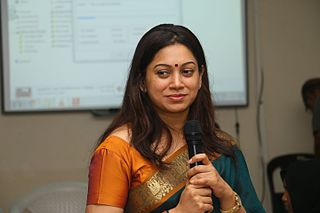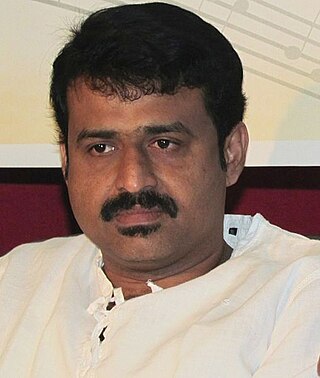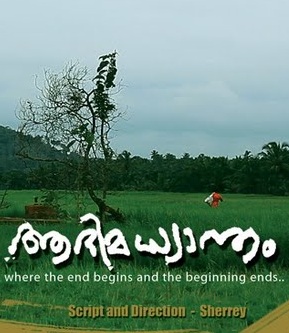
Shaji Neelakantan Karun is an Indian film director and cinematographer. His debut film Piravi (1988) won the Caméra d'Or – Mention d'honneur at the 1989 Cannes Film Festival. He was the premiere chairman of the Kerala State Chalachitra Academy, the first academy for film and TV in India and was also the executive chairman of the International Film Festival of Kerala (IFFK) from 1998 to 2001. He is best known for his award-winning films Piravi (1988), Swaham (1994), Vanaprastham (1999) and Kutty Srank (2009). He won the National Award for Best Director for his debut film Piravi. He also won two Kerala State Film Awards for Best Director for his films Swaham and Vanaprastham. Currently, he is the Chairman of Kerala State Film Development Corporation.

The Pink Mirror, titled Gulabi Aaina in India, is an Indian film drama produced and directed by Sridhar Rangayan. It is said to be the first Indian film to comprehensively focus on Indian transsexuals with the entire story revolving around two transsexuals and a gay teenager's attempts to seduce a man, Samir. The film explores the taboo subject of transsexuals in India which is still much misunderstood and ridiculed.

HIV/AIDS in India is an epidemic. The National AIDS Control Organisation (NACO) estimated that 3.14 million people lived with HIV/AIDS in India in 2023. Despite being home to the world's third-largest population of persons with HIV/AIDS, the AIDS prevalence rate in India is lower than that of many other countries. In 2016, India's AIDS prevalence rate stood at approximately 0.30%—the 80th highest in the world. Treatment of HIV/AIDS is via a combination of antiretroviral drugs and education programs to help people avoid infection.

Red Ribbon Express is an HIV/AIDS awareness campaign train by the Indian Railways. The motto of the Red Ribbon Express is "Embarking on the journey of life".

In 2008, 4.7 million people in Asia were living with human immunodeficiency virus (HIV). Asia's epidemic peaked in the mid-1990s, and annual HIV incidence has declined since then by more than half. Regionally, the epidemic has remained somewhat stable since 2000.

The International Film Festival of Kerala is a film festival held annually in Thiruvananthapuram, the capital city of Kerala, India. This film festival started in 1996 and is hosted by the Kerala State Chalachitra Academy on behalf of Department of Cultural Affairs, Government of Kerala. The festival is held in November or December every year and is acknowledged as one of the leading cultural events in India.
Madhu Eravankara is a film director, film critic, film scholar,film jury, film teacher, and author. He was born in Eravankara in Alappuzha District, Kerala, India.

Sridhar Rangayan is an Indian filmmaker who has made films with special focus on queer subjects. His queer films, The Pink Mirror, Yours Emotionally, 68 Pages, Purple Skies, Breaking Free & Evening Shadows have been considered groundbreaking because of their realistic and sympathetic portrayal of the largely closeted Indian gay community. His film The Pink Mirror remains banned in India by the Indian Censor Board because of its homosexual content.

Kerala State Motion Picture Academy is an autonomous non-profit institution based in Trivandrum, working under the Department of Cultural Affairs, Government of Kerala. It was founded in August 1998 for the promotion of cinema in Kerala, considering that cinema is the most popular art form in the state. The academy was first of its kind in India; it was formed on the basis of the Karant committee report (1980), which proposed the formation of a national film academy. Under the leadership of T. K. Ramakrishnan, The Minister for Cultural Affairs appointed Shaji N. Karun as its first chairman.

Solaris Pictures is an Indian film production company based in Mumbai. It was created by Sridhar Rangayan, and Saagar Gupta in 2001. The two have gone on to create several award-winning films under Solaris Pictures' banner, focusing on LGBT issues and HIV/AIDS.

Manjadikuru is a 2008 Indian Malayalam-language film written and directed by Anjali Menon. A shorter video version of the film was premiered at the 2008 International Film Festival of Kerala, and won the FIPRESCI Award for best Malayalam film and Hassankutty award for Best Debutant Indian director. In 2009, it received awards at the South Asian International Film Festival (SAIFF) at New York, winning five Grand Jury Awards - Best Film, Best Director, Best Screenplay, Best Cinematographer and Best Emerging Talent.

Anjali Menon is an Indian film director and screenwriter who predominantly works in Malayalam cinema. Anjali has won international, national and state awards for her work and is best known for her feature films Manjadikuru,Kerala Cafe(Happy Journey),Ustad Hotel, Bangalore Days, Koode and Wonder Women. She is counted among the change agents in Indian cinema whose work gets attention from the audience and the critics.

The National AIDS Control Organisation (NACO), established in 1992 is a division of India's Ministry of Health and Family Welfare that provides leadership to HIV/AIDS control programme in India through 35 HIV/AIDS Prevention and Control Societies, and is "the nodal organisation for formulation of policy and implementation of programs for prevention and control of HIV/AIDS in India.".

Bijukumar Damodaran, known mononymously as Dr. Biju, is an Indian homoeopathic doctor turned film director and screenwriter. He is best known for films such as Saira (2005), Veettilekkulla Vazhi (2010), Akasathinte Niram (2012), Perariyathavar (2013), Valiya Chirakulla Pakshikal (2016), Sound of Silence (2017), Painting Life (2018) and Veyilmarangal (2019).
Madhusudhanan is an Indian film maker and artist, also known as K. M. Madhusudhanan. His debut feature film, Bioscope has received many awards. He is working with different media in art, including sculpture, printmaking installation art and film.

Salem Ahamed is an Indian film director, screen writer and producer. After working for a long time as a travel consultant, he joined as a creative director and script writer in a television channel. His directorial debut, Adaminte Makan Abu (2011), fetched him numerous accolades and was screened at various international film festivals. It was also chosen as India's official entry to be considered for nomination in the Best Foreign Film category for the 84th Academy Awards. Then he made two movies Kunjananthante Kada (2013) and Pathemari (2015) with Mammootty as the lead. The latter won the Best Feature Film In Malayalam award at the 63rd National Film Awards. Salim's latest film is And the Oscar Goes To...(2019), which tells about his own experiences with the production and marketing of his first film.

Adimadhyantham is a 2011 Malayalam film written and directed by debutant Sherrey and produced by P. Rasheed, starring Prajith and Sajitha Madathil in the lead roles. Adimadhyantham won a special mention award at the 59th National Film Awards. The film is yet to get a theatrical release, but received generally positive reviews in its premiere show. It was the only Malayalam film selected to compete in the 16th International Film Festival of Kerala, but was later ousted on technical grounds, and after a huge scandal, was included for a non-competition screening.

Kanyaka Talkies is a 2013 Indian Malayalam-language film co-written and directed by K R Manoj in his feature directorial debut. It is based on a story by P. V. Shajikumar.
Kazhcha Chalachithra Vedi or Kazhcha Film Forum is a film collective in Kerala, India. It started in the year 2001 at Neyyattinkara thaluk in Thiruvananthapuram district as a collective effort of film lovers. It has produced three short films. In the year 2013 the film society has been registered under the Travancore-Cochin Literary, Scientific and Charitable Societies Registration Act, 1955.
The Human Immunodeficiency Virus and Acquired Immune Deficiency Syndrome Act, 2017, often shortened to the HIV/AIDS Prevention Act, is an act of the Parliament of India that provides for controlling and preventing of HIV/AIDS and securing the rights of individuals diagnosed with HIV/AIDS. The bill for the act was introduced in the Rajya Sabha on 11 February 2014 and was referred to a Standing Committee on 24 February 2014, which submitted its report on 29 April 2015. After few amendments to the original 2014 bill, it was passed by the Rajya Sabh on 21 March 2017 and the Lok Sabha on 11 April 2017. It received Presidential assent on 20 April 2017, and became effective from 10 September 2018. The HIV/AIDS Prevention Act originated from a draft bill submitted by Lawyers Collective, a non-governmental organization, to the National AIDS Control Organisation (NACO) in 2006. The act penalises propagation of hate against HIV/AIDS affected persons, ensures the right of HIV/AIDS affected minors to shared household, protects non-disclosure of HIV/AIDS status in the absence of court order and mandates informed consent to disclose HIV/AIDS positive identity, inter alia. However, civil society organisations and HIV/AIDS affected persons criticised the act on certain legal language issues, as it mandates the state to provide HIV/AIDS affected persons with medical services "as far as possible". This aspect was absent from the draft bill submitted to NACO.
















